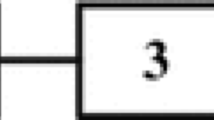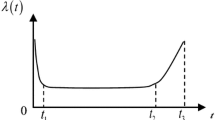Abstract
We consider a two-stage parallel-series system having three sub-systems. The independent two sub-systems of the first stage are linked in parallel and then linked to the third sub-system of the second stage in series. The deterministic two-stage parallel-series system approach is extended to uncertain/imprecise environment where the data are represented as fuzzy numbers. Using the Zadeh extension principle, we develop a fuzzy two-stage parallel-series system to determine the lower and upper bound fuzzy efficiencies of the decision-making units with the help of \(\alpha -\) cut and rank the DMUs using the ranking index approach. The proposed methodology is illustrated using the case of Taiwan’s non-life insurance companies.



Similar content being viewed by others
References
Arya A, Yadav SP (2017) A fuzzy dual sbm model with fuzzy weights: An application to the health sector. In: Proceedings of Sixth International Conference on Soft Computing for Problem Solving. Springer, pp 230–238
Charnes A, Cooper WW (1962) Programming with linear fractional functionals. Naval Res Logist Quart 9(3–4):181–186
Charnes A, Cooper WW, Rhodes E (1978) Measuring the efficiency of decision making units. Eur J Oper Res 2(6):429–444
Chen C-B, Klein CM (1997) A simple approach to ranking a group of aggregated fuzzy utilities. IEEE Trans Syst Man Cybern Part B (Cybern) 27(1):26–35
Dotoli M, Epicoco N, Falagario M, Sciancalepore F (2015) A cross-efficiency fuzzy data envelopment analysis technique for performance evaluation of decision making units under uncertainty. Comput Ind Eng 79:103–114
Emrouznejad A, Yang G-L (2017) A survey and analysis of the first 40 years of scholarly literature in DEA: 1978–2016. Socio-Economic Planning Sciences
Färe R, Grosskopf S (1996) Productivity and intermediate products: A frontier approach. Econ Lett 50(1):65–70
Färe R, Grosskopf S (2000) Network dea. Socio-Econ Planning Sci 34(1):35–49
Grabisch M, Marichal J-L, Mesiar R, Pap E (2009) Aggregation functions. vol 127. Cambridge University Press
Guo C, Shureshjani RA, Foroughi AA, Zhu J (2017) Decomposition weights and overall efficiency in two-stage additive network dea. Eur J Oper Res 257(3):896–906
Halkos GE, Tzeremes NG, Kourtzidis SA (2014) A unified classification of two-stage dea models. Surv Oper Res Manag Sci 19(1):1–16
Hatami-Marbini A, Saati S, Makui A (2009) An application of fuzzy numbers ranking in performance analysis. J Appl Sci 9(9):1770–1775
Hatami-Marbini A, Saati S, Tavana M (2010) An ideal-seeking fuzzy data envelopment analysis framework. Appl Soft Comput 10(4):1062–1070
Kao C (2014) Network data envelopment analysis: A review. Eur J Oper Res 239(1):1–16
Kao C, Hwang S-N (2008) Efficiency decomposition in two-stage data envelopment analysis: An application to non-life insurance companies in taiwan. Eur J Oper Res 185(1):418–429
Kao C, Liu S-T (2000) Fuzzy efficiency measures in data envelopment analysis. Fuzzy Sets Syst 113(3):427–437
Kao C, Liu S-T (2011) Efficiencies of two-stage systems with fuzzy data. Fuzzy Sets Syst 176(1):20–35
León T, Liern V, Ruiz J, Sirvent I (2003) A fuzzy mathematical programming approach to the assessment of efficiency with DEA models. Fuzzy Sets Syst 139(2):407–419
Lina Y, Mingxin Y (2010) A two-stage dea model to evaluate the science and technology activity efficiency. In: Electrical and Control Engineering (ICECE), 2010 International Conference on. IEEE, pp 303–306
Ma J, Chen L (2018) Evaluating operation and coordination efficiencies of parallel-series two-stage system: A data envelopment analysis approach. Expert Syst Appl 91:1–11
Sengupta JK (1992) Measuring efficiency by a fuzzy statistical approach. Fuzzy Sets Syst 46(1):73–80
Sexton TR, Lewis HF (2003) Two-stage dea: An application to major league baseball. J Prod Anal 19(2–3):227–249
Tsai H-Y, Chang C-W, Lin H-L (2010) Fuzzy hierarchy sensitive with delphi method to evaluate hospital organization performance. Expert Syst Appl 37(8):5533–5541
Yang Z (2006) A two-stage dea model to evaluate the overall performance of canadian life and health insurance companies. Math Comput Modell 43(7–8):910–919
Zadeh LA (1965) Fuzzy sets. Inf Control 8(3):338–353
Acknowledgements
The authors wish to express their sincere thanks to the anonymous reviewers for their insightful comments which have significantly improved the quality of the work. We also express our gratitude to the Editor-in-Chief and Associate Editor for coordinating the entire process and ensuring the timely reviews. This study was funded by Indian Institute of Management Calcutta, India, with Grant number RP:DFPADEAMUD /3777/2018-19.
Author information
Authors and Affiliations
Corresponding author
Ethics declarations
Conflict of interest
Alka Arya and Sanjeet Singh have received research grant from Indian Institute of Management Calcutta, India.
Ethical approval
This article does not contain any studies with human participants performed by any of the authors.
Additional information
Communicated by V. Loia.
Publisher's Note
Springer Nature remains neutral with regard to jurisdictional claims in published maps and institutional affiliations.
Rights and permissions
About this article
Cite this article
Arya, A., Singh, S. Development of two-stage parallel-series system with fuzzy data: A fuzzy DEA approach. Soft Comput 25, 3225–3245 (2021). https://doi.org/10.1007/s00500-020-05374-w
Published:
Issue Date:
DOI: https://doi.org/10.1007/s00500-020-05374-w




